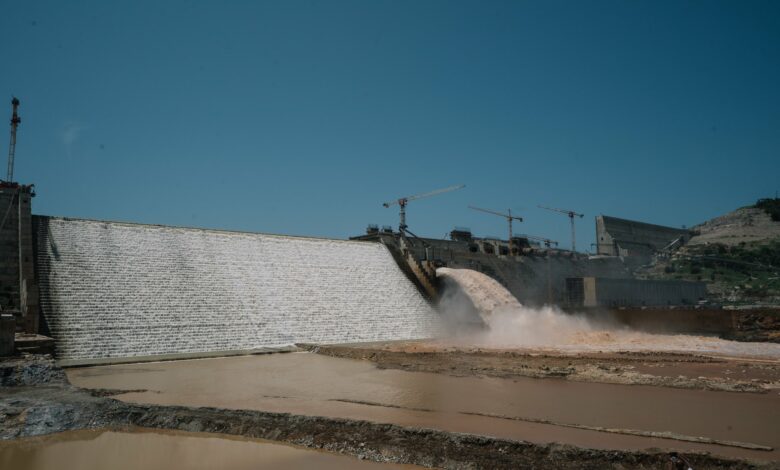
A binding legal agreement must be reached on the Grand Ethiopian Renaissance Dam (GERD), amid climate change and water security challenges, President Abdel Fattah al-Sisi said during his speech at the Arab Summit in Algeria on Wednesday.
Egypt’s water resources have become unable to meet the needs of its population despite following a policy to rationalize consumption, through the frequent reuse of agricultural irrigation water that made the overall efficiency rate of its use in Egypt one of the highest rates in Africa.
The Ethiopian government announced on August 11 that it has completed the third GERD filling unilaterally.
It announced the operation of the second turbine in GERD to generate electric power, which comes in light of the tension between Addis Ababa and Egypt, Sudan due to what the two countries consider a negative impact of the dam on their water shares of the Nile River.
Egypt and Sudan say they want a legally binding agreement on operating the dam, while Ethiopia says any pact should be advisory.
Both countries consider the dam a threat to their vital water supplies, while Ethiopia considers it essential for development and doubling its electricity production.
The downstream nations fear possible blows to water facilities, agricultural land, and overall availability of Nile water.
Stagnant talks
Negotiations over the dam between Egypt, Ethiopia, and Sudan have stalled for years, with the three parties ultimately failing to reach any agreements.
The disputed dam is the largest hydroelectric project in Africa, with a cost of more than four billion dollars.
Climate change has become a reality imposed on the world, and the dilemma of water security portends dire consequences if ignored, he said, stressing the need to preserve common Arab unity to face challenges.
Arab league convenes
Sisi said he was looking forward to receive Arab delegations in Sharm el-Sheikh in November to implement climate pledges.
A settlement of the situation in Libya needs to be reached as soon as possible, and foreign forces must leave Libyan territory, Sisi said, adding that the ability of Arab countries to work collectively to settle the Palestinian issue will remain the true criterion for their cohesion.
Various Arab leaders held a closed consultative session on a number of important issues, which represent a priority for joint Arab action and ways to achieve consensus to face the many challenges and threats facing Arab countries politically, economically and security wise.
The consultative session is scheduled to be followed by a public working session, during which the Arab leaders will speak according to the priority of the speech request, followed by a second closed working session in order to adopt and discuss the draft agenda and adopt draft resolutions.
Then a final public session will follow, during which the “Algeria Declaration” will be announced.
A speech by the president of the upcoming 32nd Arab Summit will be given, and then a final speech by the Algerian president.
Algerian Foreign Minister Ramadan Lamamra and Arab League Secretary General Ahmed Aboul Gheit will hold a joint press conference on Wednesday evening to announce the outcomes of the summit and the decisions that resulted from it.
Brotherly bonds
On Wednesday Sisi met with Tunisian President Kais Saied, on the sidelines of the Arab Summit.
The official spokesperson for the Egyptian Presidency Bassam Rady said that President Sisi expressed his appreciation for the close and historical relations that unite the two countries, as well as their extended cultural intertwining, wishing all success to the executive authority in Tunisia under Saied’s leadership.
He stressed Egypt’s aspiration to develop bilateral relations between the two countries into a sustainable framework of economic integration and strategic cooperation, and assured Egypt’s support for all ongoing efforts to continue the development and reform process in Tunisia.
On his end, Saied affirmed the depth of the ties between the two countries, and his country’s keenness to elevate cooperation with Egypt to the level of strategic partnership for the benefit of the two peoples and as a cornerstone for maintaining regional security and stability.
He said his country looks forward to benefiting from the successful Egyptian experience in implementing development projects and comprehensive economic reforms, as well as learning about the tireless Egyptian efforts in combating terrorism and extremism.
Rady added that the meeting witnessed a review of ways to advance the solid bilateral relations between the two brotherly countries in various fields, in addition to consultations on the most prominent regional issues of common interest.



